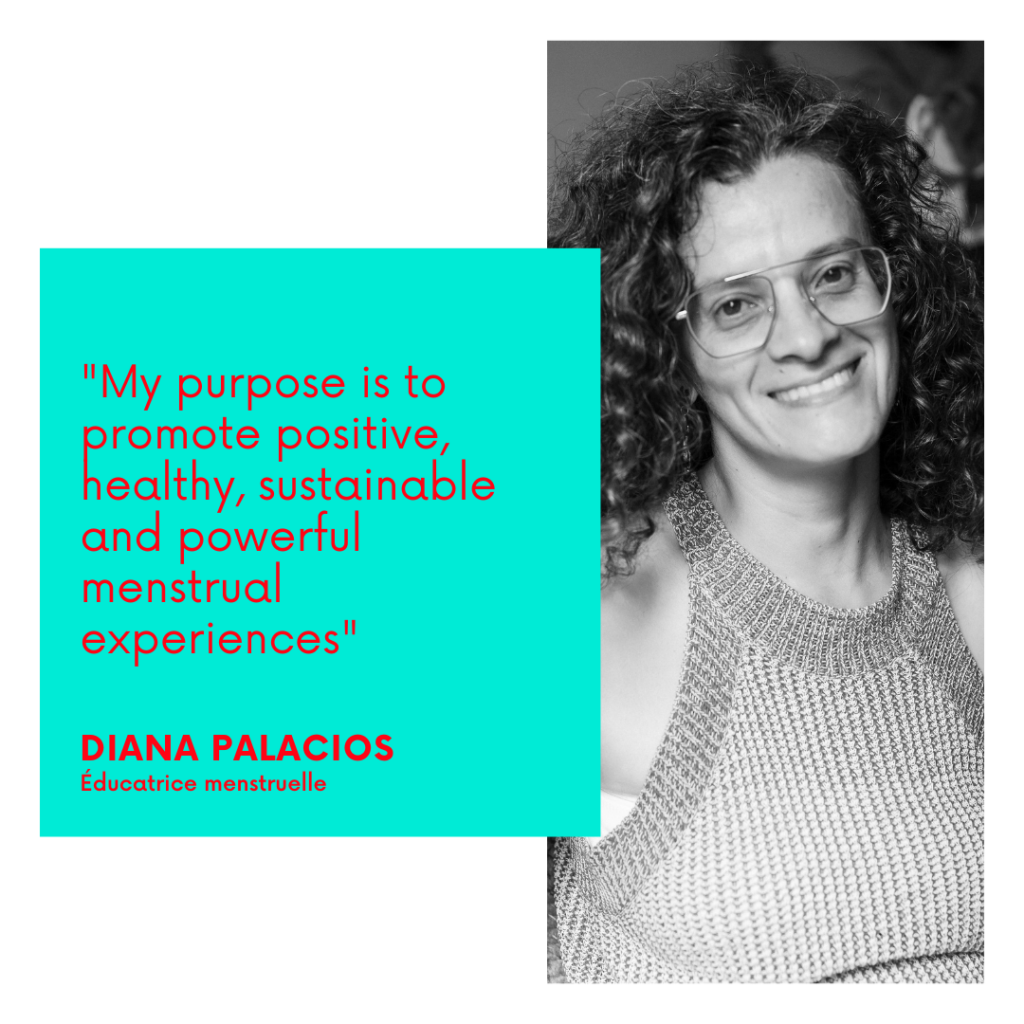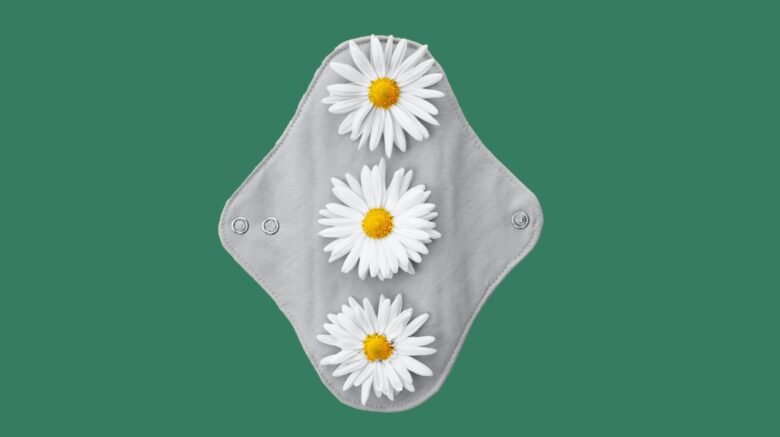Even though any manufacturing process of a product causes an impact on nature, to a greater or lesser degree, reusable products in general are thought and designed to have a longer life cycle and, therefore, a lower environmental impact compared to single-use products.
In the case of reusable menstrual products, their impact is less than that of conventional disposable products of the consumption of fossil fuels, the contamination of water, air, and soil, deforestation, and the contribution to global warming.
Based on life cycle assessments of different menstrual products it is estimated that a reusable cup will only create a 0.04kg CO2 equivalent for one year, while a year’s worth of tampons will require a 5.26kg CO2 equivalent. With the expected lifespan of a menstrual cup being five years, menstruators can save 26.1kg CO2 equivalent every five years (5.22kg annually) by choosing a reusable cup over tampons.


Although the reusable options require water consumption for their use and cleaning, they avoid the major and most worrying environmental impact of disposable menstrual products; the generation of large amounts of waste.
A person who uses reusable cloth pads during her fertile life will generate a total of 2.4 kg of waste throughout her life. While with the use of tampons and disposable pads, you will end up generating almost 180 kg of waste. In other words, using the option of reusable pads, a person can prevent up to 177.3 kg of waste throughout their life.


In addition, reusable products such as menstrual cups, cloth towels, and underwear for menstruation are usually free of toxins such as dyes, perfumes, bisphenols, pesticides, bleaches, and plastic. These products also prevent the accumulation of menstrual waste in seas or oceans, since at the end of their useful life they can be compostable, which reduces the chances that they end up flushed down the toilet or abandoned in the environment.
Another benefit of reusable menstrual products is saving money in the medium and long term. Although the unit price of reusable menstrual products is indeed higher than the price of disposable products, it is clear that in the long run, they end up being much cheaper.
When people buy and use reusable menstrual products, and make a single investment for periods that can range from one to five years or so, without worrying about spending more money from their budget to manage their period, this is a significant relief for your economy since menstrual products are essential products for women and menstruaters.
In addition, reusable menstrual products, such as cloth pads, can be self-managed, this means that the same people can make them at home with cotton t-shirt fabric or towels, they can be sewn by hand or with a sewing machine, Which means women and menstruaters can access self-made reusable menstrual products, free of charge and independent of any industry.
According to The National Union of Public and General Employees-NUPGE (2022) a person who is menstruating and uses disposable products in Canada will spend an average of 6,000 CAD on tampons and sanitary napkins throughout her fertile life if she lives in a city, but if you live in a rural area or indigenous community, they will pay double. While if they choose to use a menstrual cup the cost will be 270 CAD, for the use of cloth towels the cost will be 400 CAD, for the use of menstruating underwear the cost will be 800 CAD.

Opting for reusable menstrual products also saves money for local governments and citizens by reducing public money costs associated with the management and processes of treatment and disposal of conventional menstrual products. As well as expenses related to the maintenance of pipes and sewage systems and with the cleaning of beaches and collection of marine waste on the coasts.
Another important issue regarding reusable menstrual products is to recognize the local economy that arises around them since it is small and medium-sized enterprises and social organizations that promote, manage, and educate the most about these alternative products, led by the majority of women, made manually and using ecological materials. In addition to facilitating menstruating women and people access and availability to menstrual cups, cloth towels, and underwear, without having to depend on the monopolized market of the so-called feminine hygiene industry, which by the way, is not made a charge of the waste derived from the products they put on the market.
Reusable menstrual options allow you to become aware of the menstrual cycle and its mental, emotional, and physical changes, allowing you to recognize your own body by touching and observing it. Thus, for example, when using the menstrual cup, the vulva, and vagina are palpated, allowing us to recognize its shape, texture, color, and smell, being in many cases a new, reckless but empowering experience for most menstruators.
Likewise, reusable menstrual products allow you to come into direct contact with menstrual blood and be able to see, smell and feel it as it is, as a vital sign of health and not as waste. Being free of plastics, reusable menstrual products do not oxidize menstrual blood, so the color of the blood does not change from red to brown, and there is no sensation of heat and no bad odors, as is the case with tampons and disposable sanitary napkins. This positively redefines the look that menstruating people have on their bodies, their menstrual cycle, and their blood.
A Zero Waste Menstruation means:
- Menstruating in a safe, healthy, and informed way;
- Freeing menstruating bodies and the planet from the use of plastics;
- Supporting locally made menstrual products;
- Breaking the cycle of using and throwing away, long-life reusable menstrual products.
Here are some tips to encourage you to live zero-waste menstruation, from disposable to reusable:
Know your menstrual cycle
Learn to read your cycle and understand what happens in each phase, it can help you get to know yourself better and lead a lifestyle in harmony with your body.
Evaluate your options
Find out about all the reusable menstrual products available, what their characteristics and operation are, and assess which one best suits your needs.
Find out about purchase options
When buying the product you have chosen. It is important to choose an option that is safe for your body, respectful of nature, and made locally.
Take confidence
At first, it is normal that it is not entirely comfortable for you or it seems strange to you since it is a change that breaks taboos. It is a matter of practice and patience. Make the change gradually.
Live your new cycle
If you feel like it, share your experience with those around you and speak for the change toward an accepted, informed and healthy menstruation for people and the planet.

Diana Palacios,
Menstrual educator
References
1. Guia cap a una menstruació https://rezero.cat/wp-content/uploads/2020/10/Guia-REVISADA-Catalunya.pdf Residu Zero. (2020).
2. Rezero, Break Free From Plastic, Zero Waste Europe, Reloop (2019). The Environmental & Economic costs of Single Use Menstrual Products, Baby Nappies & Wet Wipes. Europe. https://rezero.cat/wp-content/uploads/2020/06/eng_2019_single_use_menstrual_products_b aby_nappies_costs_impact.pdf
3. Period Poverty in Canada (2022). https://mail.google.com/mail/u/0/#search/mila.zielinski%40rqasf.qc.ca/KtbxLthZjhhMcXKVqG ZdWjpKwLKDjrCcxV?projector=1&messagePartId=0.1
Menstrual pad workshop, by Diana Palacios
- For whom? Menstruators
- Where? Montreal
- Cost? Free
- When? Date to be determined together
- Languages : Spanish and English
Diana Palacios is an environmental engineer and professor from Latin America. After arriving in Canada, she decided to create her own business that would allow to link her environmental sensitivity – a subject she is passionate about – and her love for teaching.
Trained in menstrual education, she organizes workshops and sells durable menstrual pads made from pre-washed cotton that she sews herself.
Workshop participants will have the opportunity to talk about their menstruation in a friendly environement and learn how to sew their own washable menstrual pads from the recovered fabrics.
If you would like to offer this workshop to your participants, contact Diana.
To follow Diana on social media:
Instagram: @happyperiods2020
Facebook: Happy PeriodS

